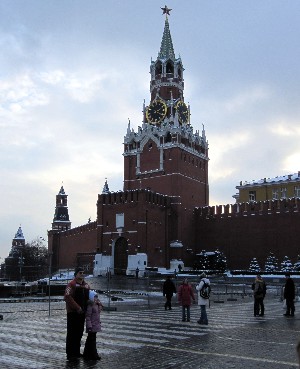The Return of «ибо»! Posted by josefina on Feb 2, 2010 in language, News
When in Moscow it is a rule to go for a stroll «на Красной площади» [on the Red Square], «ибо это делают все» [because everybody does that] «и туристы, и провинциалы» [both tourists and people from the provinces]. «Провинциал» means ‘provincial, backwoodsman; unsophisticated person’. The female version of the word is «провинциалка».
When I first started studying Russian language some six years ago nobody ever said «ибо» [because, for]. You didn’t hear it in spoken everyday speech at all just a few years back, «ибо» [because] it was considered «устаревший союз» [an outdated, outworn, outmoded conjunction] by everyone. You’d only come across it while reading some Russian 19th century novel, like for example «Преступление и наказание» [“Crime and Punishment”] by «Фёдор Михайлович Достоевский» [Fyodor Mikhailovich Dostoevsky], but that was about it. Back then I had to go straight to my old faithful dictionary to find out what exactly «Федя» [‘Fedya’, diminutive of Fyodor] had meant by using the strange yet cute little conjunction «ибо». The first time I heard «ибо» pronounced out loud was when my «научный руководитель» [(in Russian: scientific) academic guidance counselor] here in Yekaterinburg told me an unsettling and upsetting story from his time as a student back in Soviet time. He had received the grade «хорошо» [good] instead of «отлично» [excellent] for his «дипломная работа» [‘graduation project’, the equivalent of a Bachelor’s thesis] due to having once in it used «ибо» instead of the more colloquial and commonly accepted «потому что» [as, because]. Now things have changed a lot in Russian society since then (not only linguistically as we all know), and «ибо» is clearly and definitely on its way back!
«Ибо» [for, because] is nothing but a petite synonym to the popular conjunctions «потому что» [as, because] and «так как» [as, because, since, being that, syne, inasmuch as, in that], but with one important thing differing it from these two: it creates a ‘weaker’ link between two parts of a sentence connected logically with each other. And that’s why you can use «ибо» both «после запятой» [after a comma] as well as «после точки» [after a dot]. Here’s an illustrative example of this from the above mentioned masterpiece «Преступление и наказание» [“Crime and Punishment”] by hands-down the most influential on the 20th century Russian writer «Достоевский» [Dostoevsky]:
«Ибо хотя вы и не в значительном виде, но опытность моя отличает в вас человека образованного и к напитку непривычного» [For even though you are not in respectable appearance, but my proficiency distinguishes in you a person who is educated and unaccustomed to liquor”].

When «в Московском метро» [in the Moscow metro (subway, underground railway system)] it is imperative «смотреть вверх» [to look up] «ибо там очень красиво» [because there it is very beautiful]. Not on all stations, of course, but on quite a lot of them – especially in the center…
All of the sudden – that’s what it felt like for me anyway – «ибо» was everywhere! Everyone was saying it! Last fall I started to find it in text-messages from Russian friends all the time. Which is only natural, because «ибо» only takes up three letters in the text-message whereas you’ll spend an entire ten spelling out the long and complicated «потому что». One could also write the synonym «так как» as «т. к.», but that’s also three letters – the same amount needed for «ибо». And let’s face it – «ибо» sounds a lot better. It sounds educated and a bit fancy (a charm which it will surely loose once it gets too accepted and commonly used). People who know more about this than me says «ибо» started its return to Russian language by way of «газетный язык» [newspaper language] and then through that made the brave crossover into «разговорный язык» [conversational, spoken language]. Honestly, I like «ибо» very much. It is a conveniently tiny word that’s fast to write and takes little to no time to pronounce. And you can start a sentence with it without looking like a fool – something you’re bound to give the appearance of being if you try beginning a sentence with «потому что».
But far from all Russians are as fond of this new-old word as I am. I asked a good friend of mine what she thought of the return of «ибо». She answered: «я ненавижу ибо!» [I hate ‘ibo’!] Then I asked her why, and she actually used it in her answer… She said: «ибо это было старомодное слово, а сейчас оно просто модное» [For it used to be an old-fashioned word, but now it is just trendy]. Be that as it may, I still think it is an interesting conjunction worth trying out at least once while learning Russian. Maybe it is just a fad and maybe it’ll go away. But it might as well be here to stay! And that’s why I’ll give the last word to «Михаил Лермонтов» [Mikhail Lermontov] and a sentence from the beginning of his splendid novel «Герой нашего времени» [“A Hero of Our Time”]:
«Я пригласил своего спутника выпить вместе стакан чая, ибо со мной был чугунный чайник – единственная отрада моя в путешествиях по Кавказу» [I invited my companion to drink a cup of tea with me, for with me I had a cast iron teapot – my only comfort while traveling the Caucasus].

Build vocabulary, practice pronunciation, and more with Transparent Language Online. Available anytime, anywhere, on any device.





Comments:
Moonyeen:
How about the Pushkinskaya Station in St. Petersburg . . . sorry, the photo would not print.
Statues of poets with fresh flowers in metro stations. Russia! What a country!
Josefina:
Moonyeen, I completely agree with you about the Pushkinshaya station in St. Petersburg! So beautiful! I didn’t see any fresh flowers on the metro in Moscow though… And the metro here in Yekaterinburg is outright ugly – they’ve got this “metall and stone” theme going on (no big suprise there, though, as we are in the Urals) and it looks depressing. There’s so much grey things already, why can’t the metro be a safe haven?!